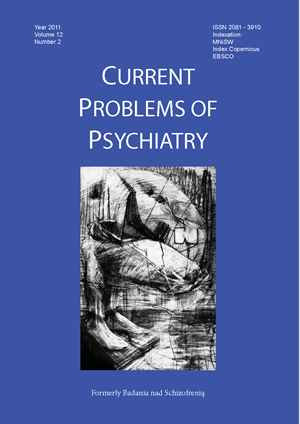Stress and debriefing – definitions and current controversies
Keywords:
debriefing, stress, crisis interventionAbstract
The phenomenon of stress is an extremely important issue for modern science. For many years, it has been subjected to numerous tests. There are three ways of understanding the term stress: stress understood as a stimulus, as a reaction of the body as well as a transaction that occurs between the unit and its surroundings. Finding effective ways to prevent the consequences of traumatic stress involves experts from various fields and is an important area of research. Particularly difficult issue is to help those who, in connection with their profession are vulnerable to negative consequences of stress (ER doctors, firemen, policemen, etc.). It seems important to use the methods which are characterized by proven effectiveness in research. One of currently undergoing intensive research method is created by Mitchell, and developed and modified by subsequent researchers, the Critical Incident Stress Debriefing (CISD). The authors present theoretical models of stress, and describe current models of debriefing which functions as one of the methods of crisis intervention. The article contains also an overview of research on a variety of applications and effectiveness of psychological debriefing. It summarizes the difficulties and restrictions on the use of this method.
References
1. Bishop G. Psychologia zdrowia. Wrocław; Astrum: 2007.
2. Heszen-Niejodek I. Teoria stresu psychologicznego i radzenia sobie. W: Strelau J. red., Psychologia. Gdańsk; GWP: 2007, s. 465-492.
3. Ogińska-Bulik N. Rola stresu w etiopatogenezie chorób. Zeszyty Naukowe WSHE w Łodzi, 2001; 2(15): 7-16.
4. Sheridan C.L., Radmacher S.A. Psychologia zdrowia. Warszawa; Instytut Psychologii Zdrowia PTP: 1998.
5. Heszen I., Sęk H. Psychologia zdrowia. Warszawa; PWN: 2007.
6. Wrześniewski K. Style a strategie radzenia sobie ze stresem. Problemy pomiaru. W: Heszen-Niejodek I., Ratajczak Z. red. Człowiek w sytuacji stresu. Problemy teoretyczne i metodologiczne. Katowice; Wydawnictwo Uniwersytetu Śląskiego: 2000, s.44-63.
7. Lipczyński A. Psychologia interwencyjna w sytuacjach kryzysowych. Warszawa; Difin: 2007.
8. McNally J.R. Psychological Debriefing Does Not Prevent Post-traumatic Stress Disorder. Psychiatric Times, 2004; 21(4): 71-74.
9. Tehrani N., Rose S. History, methods and development of psychological debriefing W: Tehrani N. red. Psychological debriefing. Leicester. Professional Practice Board Working Party The British Psychological Society: 2002, s. 2-8.
10. Ormerod J. Current research into the effectiveness of debriefing. W: Tehrani N. red. Psychological debriefing. Leicester: Professional Practice Board Working Party The British Psychological Society: 2002, s. 8-18.
11. Amir M., Weil G., Kaplan Z., Tocker T., Witzium E. Debriefing with brief group psychotherapy in a homogenous group of no-injured victims of a terrorist attack: A prospective study. Acta Psychiatr. Scand., 1998; 98: 237-242.
12. Carlier I.V.E., Lamberts R.D., van Uchelen A.J., Gersons B.P.R. Disaster-related post-traumatic stress in police officers: A field study of the impact of debriefing. Stress Medicine, 1998; 14: 143-148.
13. Marchand A., Guay S., Boyer R., Iucci S., Martin A., St-Hilaire M. A Randomized Controlled Trial of an Adapted Form of Individual Critical Incident Stress Debriefing for Victims of an Armed Robbery. Brief Treatment and Crisis Intervention, 2006; 6(2): 122-129.
14. Mayou R.A., Ehlers A., Hobbs M. Psychological debriefing for road traffic accident victims. Three-year follow-up of a randomised controlled trial. Br. J. Psychiatry., 2000; 176: 589-593.
15. Gururaja R.P., Yang T., Paige J.T., Chauvin S.W. Examining the Effectiveness of Debriefing at the Point of Care in Simulation-Based Operating Room Team Training. In: Henriksen K., Battles JB., Keyes MA., Grady ML. (ed.) Advances in Patient Safety: New Directions and Alternative Approaches Vol. 3: Performance and Tools. Rockville (MD); Agency for Healthcare Research and Quality (US): 2008.
16. Nadler I., Sanderson P.M., Van Dyken C.R., Davis P.G., Liley H.G. Presenting video recordings of newborn resuscitations in debriefings for teamwork training. BMJ Qual. Saf., 2011; 20(2):163-169.
17. Sahin N.H., Batigün A.D., Yilmaz B. Debriefing with teachers after the Marmara earthquake: an evaluation study. Disasters, 2009; 33(4):747-761.
18. Choe I. The Debate over Psychological Debriefing for PTSD. The New School Psychology Bulletin, 2005; 3(2): 71-82.
Downloads
Published
Issue
Section
License
Copyright (c) 2011 Authors

This work is licensed under a Creative Commons Attribution-NonCommercial-NoDerivatives 3.0 Unported License.


